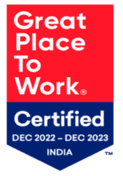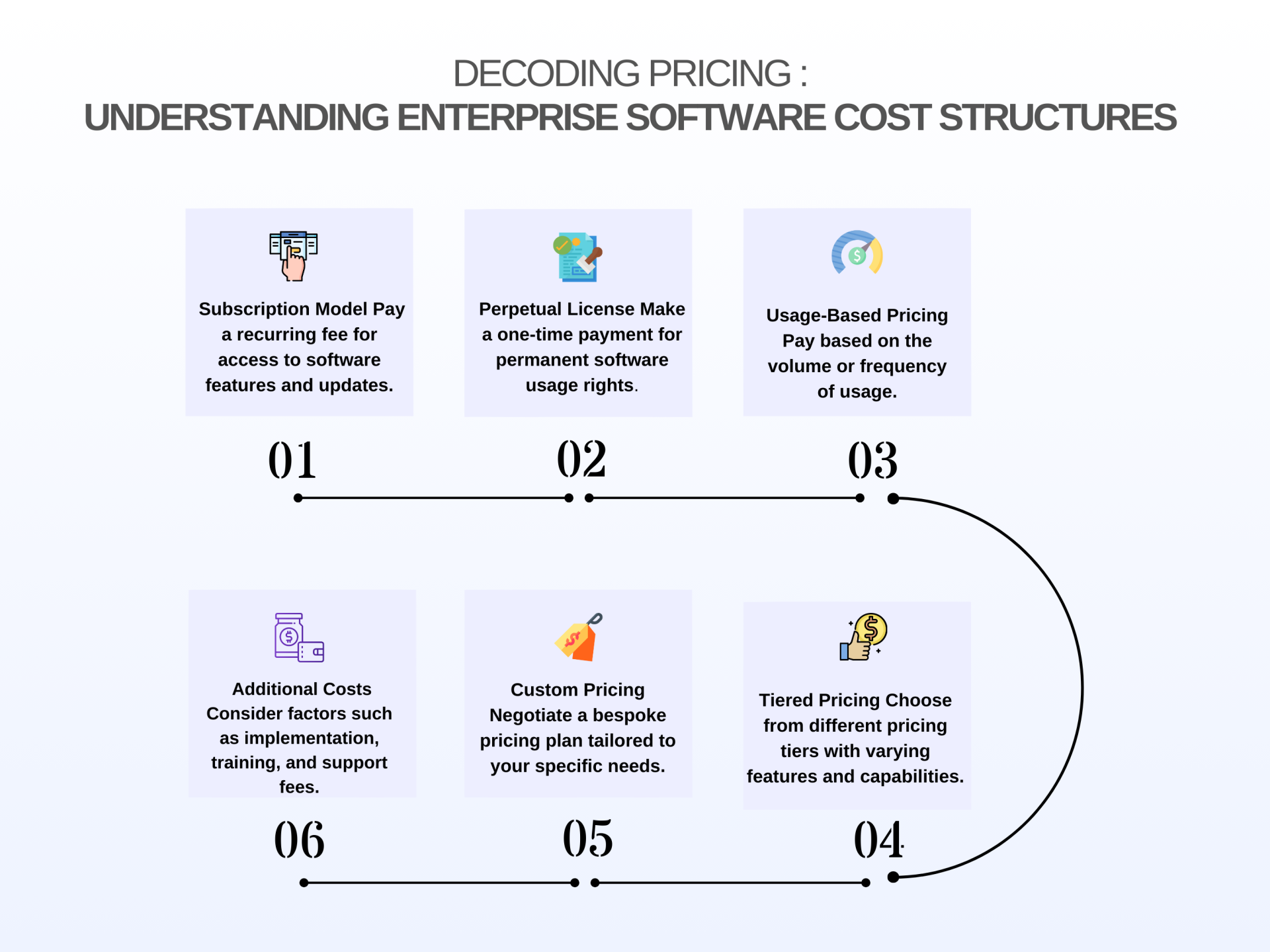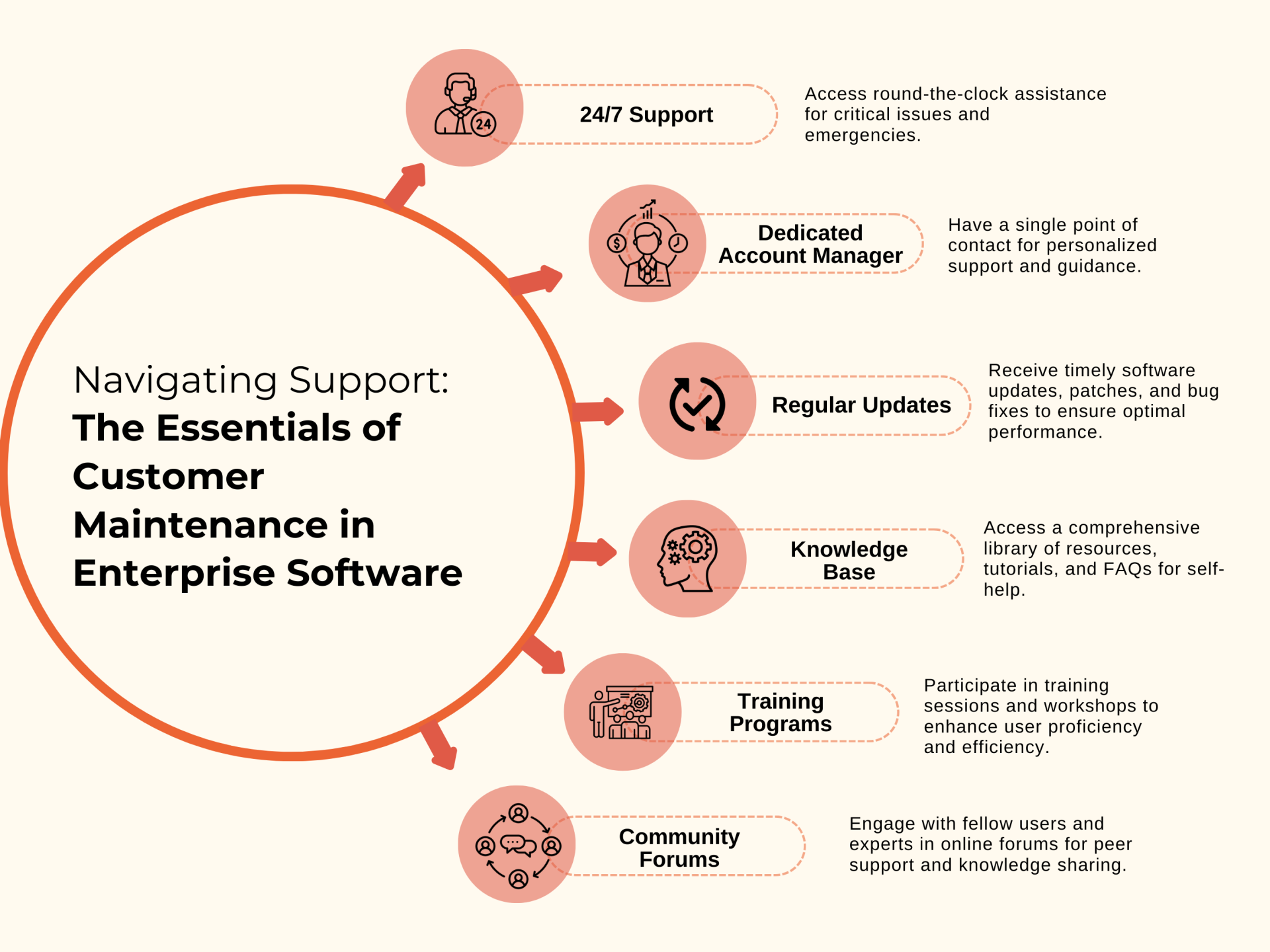The selection of the right enterprise software company is paramount for businesses aiming to streamline operations, enhance productivity, and stay competitive. With an ever-expanding array of software solutions available, the process of vetting enterprise software companies has become increasingly complex.
According to recent market research conducted by Gartner, the global enterprise software market is projected to reach a value of $426 billion by 2024, with businesses across various industries investing heavily in software solutions to meet their evolving needs. This surge in demand has led to a proliferation of software providers, making it essential for businesses to carefully evaluate and select the most suitable partner.
However, the abundance of options can be overwhelming, and without a structured approach to vetting, businesses risk making costly mistakes. This is where a comprehensive list of crucial inquiries comes into play. Asking the right questions gives businesses valuable insights. They learn about the expertise, capabilities, and reliability of software companies. This ensures they make informed decisions that fit their goals. From assessing experience and expertise to clarifying pricing structures and contract terms, each inquiry plays a crucial role in the vetting process.
In this article, we present a curated list of 20 crucial inquiries that custom software development services should consider when vetting enterprise software companies. These inquiries are designed to cover key aspects of the evaluation process, providing businesses with a comprehensive framework for selecting the right partner. No matter the size of your company, our solution provides the knowledge and tools to navigate the complex world of enterprise software providers, empowering you to make confident choices that drive success.
Understanding Enterprise Software Companies: Defining Their Role in Business Transformation
Enterprise software companies play a key role in modern business transformation. They offer tailored solutions to solve the complex challenges faced by organizations across many industries. These companies specialize in making software. The software is designed to streamline operations, boost productivity, and drive innovation. As businesses increasingly rely on technology to gain a competitive edge, the role of enterprise software companies has become more crucial than ever.
1. Tailored Solutions
Firstly, Enterprise software companies understand that one size does not fit all. They develop customized solutions tailored to the specific needs and requirements of each client, ensuring optimal functionality and efficiency.
2. Business Process Optimization
Secondly, By analyzing existing workflows and identifying inefficiencies, enterprise software companies help businesses optimize their processes to achieve greater productivity and cost savings.
3. Integration Capabilities
Enterprise software solutions often need to integrate with existing systems and platforms within a custom enterprise software development company. These companies possess the expertise to seamlessly integrate new software with legacy systems, ensuring smooth operation and minimal disruption.
4. Scalability
As businesses grow and evolve, their software needs may change. Enterprise software companies develop scalable solutions that can adapt to accommodate growth and expansion, allowing businesses to remain agile and responsive to market demands.
5. Innovation and Research
Enterprise software companies invest heavily in research and development to stay ahead of emerging trends and technologies. They continuously innovate to deliver cutting-edge solutions that address the evolving needs of their clients.
6. Training and Support
Implementing new software can be challenging for employees. Enterprise software companies provide comprehensive training and ongoing support to ensure a smooth transition and maximize the new system’s benefits.
7. Data Security and Compliance
Data breaches are becoming increasingly common, so data security is a top priority for businesses. Enterprise software companies implement robust security measures to protect sensitive information and ensure compliance with industry regulations.
8. Return on Investment (ROI)
Ultimately, the goal of enterprise software is to deliver a positive return on investment. Enterprise software companies work closely with clients to track and measure the impact of their solutions, ensuring that they deliver tangible results and drive business growth.
How Can Enterprise Software Companies Help You Achieve Your Goals?
Enterprise software companies are instrumental in helping businesses achieve their goals by providing tailored solutions that address specific challenges and drive growth. Whether it’s streamlining operations, enhancing productivity, or fostering innovation, these companies offer a range of services and expertise to support organizations in their quest for success.
1. Customized Solutions
Firstly, enterprise software development companies understand that every business is unique, with its own set of goals and challenges. They offer customized solutions tailored to the specific needs and objectives of each client, ensuring that the software aligns seamlessly with the organization’s goals.
2. Streamlining Operations
Secondly, One of the primary goals of enterprise software is to streamline business operations and improve efficiency. Enterprise software companies develop solutions that automate repetitive tasks, streamline workflows, and optimize processes, allowing businesses to operate more smoothly and effectively.
3. Enhancing Productivity
Enterprise software companies provide tools and technology that help with collaboration, communication, and task management. They help businesses boost productivity at all levels. From project management software to communication platforms, these solutions empower employees to work more efficiently and effectively.
4. Fostering Innovation
Innovation is essential for staying ahead in today’s competitive business landscape. Enterprise software companies develop cutting-edge solutions. These help businesses to innovate and stand out in the market. They do this by using advanced analytics, AI, or IoT. These companies help drive innovation and fuel growth.
5. Supporting Growth
As businesses grow and evolve, their software needs may change. Enterprise software companies provide scalable solutions. They can grow with the best custom software development companies, allowing businesses to adapt to change. As a result, outdated technology does not prevent them from growing and adapting to market conditions.
6. Improving Customer Experience
Enterprise software companies also play a crucial role in improving the customer experience. By providing tools and technologies that enable businesses to better understand their customers, personalize interactions, and deliver exceptional service, these companies help businesses build stronger relationships and customer loyalty.
7. Ensuring Compliance and Security
Lastly, Compliance with industry regulations and data security are top priorities for businesses today. Enterprise software companies develop solutions. Therefore, they follow strict compliance standards and have robust security. This security protects sensitive data. It ensures that businesses can operate with confidence and peace of mind.
Ready to Build? Let’s Create Your Software Solution Today!
Vetting an Enterprise Software Company: Guide to 20 Essential Inquiries
Selecting the right enterprise software company is a critical decision that can significantly impact your business’s success and growth. Technology solutions are getting more complex. There are many options in the market. You need to do thorough due diligence. This ensures you partner with a company that fits your goals and requirements. This guide provides a comprehensive overview of 20 essential inquiries to consider when vetting a top enterprise software company. From assessing their experience and expertise to evaluating their approach to project management, testing, and support services, each inquiry is designed to help you make an informed decision and ultimately choose a partner that can deliver results and drive your business forward.
1. Experience and Expertise
Firstly, Assessing the experience and expertise of an enterprise software company is crucial in determining its ability to meet your business needs effectively. Look for companies with a proven track record in developing software solutions tailored to your industry. Evaluate the depth of expertise within their team, including hire software developers, engineers, and project managers. A company with lots of experience in your industry is more likely to understand your unique challenges and needs. This will let them deliver clever and useful solutions.
2. Client References
Secondly, Requesting references from past clients allows you to gain valuable insights into the company’s track record and customer satisfaction. Contact these references. Learn about their experience working with the company. Ask about the quality of their solutions, the level of support, and their overall satisfaction. Positive references indicate a reliable and reputable enterprise software company that is capable of delivering results and maintaining strong client relationships.
3. Portfolio of Past Projects
Reviewing the company’s portfolio of past projects provides visibility into its capabilities and areas of expertise. Look for projects that are similar in scope and complexity to your requirements. Evaluate the quality of their work, user interface design, and overall functionality. A diverse portfolio that showcases successful projects across different industries demonstrates the company’s versatility and ability to adapt to various client needs.
4. Technology Stack
For determining compatibility with your current infrastructure and future scalability, it is crucial to comprehend the technology stack the enterprise software company uses. Inquire about the programming languages, frameworks, and tools they employ in their development process. A modern and flexible technology stack ensures that the company can deliver cutting-edge solutions that meet your evolving business needs and integrate seamlessly with your existing systems.
5. Customization Capabilities
Customization capabilities are critical for ensuring that the software solution meets your specific needs and preferences. Ask about the company’s approach to customization. Can they tailor the solution to your needs? Look for examples of how custom enterprise software development companies have tailored solutions for past clients. Therefore, they did this to address specific challenges and achieve desired outcomes. A company that offers robust customization capabilities can deliver a solution that aligns perfectly with your business objectives and workflows.
6. Integration with Third-party Systems
Many businesses rely on a variety of third-party systems and platforms to support their operations. It is essential to ensure the software can fit with these systems. This is key for maximizing efficiency and productivity. Inquire about the company’s experience and expertise in integrating their software with third-party systems, such as ERP systems, CRM platforms, and accounting software. Look for examples of successful integrations they have completed for past clients to gauge their proficiency in this area.
7. Data Security Measures
Data security is a top priority for businesses. This is especially true for enterprise software solutions that handle sensitive information. Inquire about the company’s data security measures and protocols to ensure that your data will be protected against unauthorized access, breaches, and other security threats. Look for companies that follow industry best practices. Therefore, they also comply with relevant rules and standards, such as GDPR, HIPAA, or PCI DSS. Also, ask about their data encryption. Ask about their access controls and security audits. These measures reduce risks and protect your data.
8. Support and Maintenance Services
Effective support and maintenance services are essential for ensuring the ongoing performance and reliability of your enterprise software solution. Inquire about the company’s support offerings, including the availability of technical support staff, response times for resolving issues, and channels for contacting support. Also, ask about their approach to updating software. This includes patches and bug fixes. It’s to ensure that your solution stays up-to-date and secure. Look for custom software development companies in USA that offer proactive support and ongoing maintenance plans to minimize downtime and maximize the value of your investment.
9. Scalability of Solutions
Scalability is critical for ensuring that your enterprise software solution can grow and adapt to meet your evolving business needs. Ask about the scalability of the company’s solutions. Can they handle more users, data, and transactions over time? Look for examples of how they have scaled solutions for past clients to accommodate growth and expansion. Additionally, ask about their approach to architecture design, database management, and infrastructure provisioning to ensure that your solution can scale seamlessly as your business grows.
10. Pricing Structure
Understanding the pricing structure of an enterprise software company is essential for budgeting and financial planning. Ask about their pricing model. Is it based on a one-time license fee, subscription, or usage? Additionally, ask about any additional costs or fees, such as implementation fees, customization fees, or ongoing support fees. Look for transparency and clarity in their pricing structure to avoid unexpected costs or overruns. Additionally, consider factors such as total cost of ownership, return on investment, and long-term value when evaluating pricing options.
11. Contract Terms and Conditions
Review the contract terms. It is key for clarifying duties, hopes, and rights. Do this before partnering with an enterprise software company. Carefully review the contract terms, including the scope of work, project timelines, deliverables, payment terms, and termination clauses. Look for clarity and specificity in the contract language to avoid misunderstandings or disputes down
12. Communication Channels
Effective communication is key to a successful partnership with an enterprise software company. Ask about the company’s communication channels. Also, ask about their protocols for keeping stakeholders informed and engaged during the project. Ensure that there are clear lines of communication between the project team and key stakeholders, including regular status updates, progress reports, and feedback sessions. Also, clarify expected response times for inquiries and issue resolution. This will ensure timely communication and alignment between both parties.
13. Project Management Approach
Understanding the company’s project management approach is essential for ensuring that your project stays on track and is completed successfully. Inquire about the methodologies and frameworks they use for project management, such as Agile, Scrum, or Waterfall. Judge their approach to setting project timelines. Define milestones and manage resources to ensure that your project is on time and within budget. Additionally, inquire about their processes for risk management, issue escalation, and change management to address any challenges that may arise during the project.
14. Testing and Quality Assurance Processes
Thorough testing and quality assurance are essential. They ensure the reliability, performance, and usability of your enterprise software. Inquire about the company’s testing methodologies, including unit testing, integration testing, and user acceptance testing. Evaluate how they find and fix defects, bugs, and usability issues. This will ensure that your solution is high quality. Also, ask about their commitment to continuous improvement. They do this through feedback loops and post-launch monitoring. These help optimize your solution over time.
15. Training and Onboarding Support
Effective training and onboarding support are critical for ensuring a smooth transition to your new enterprise software solution. Ask about the company’s training offerings. These include user training sessions, documentation, and online resources. Evaluate their approach to onboarding and user adoption to minimize resistance to change and maximize the value of your investment. Also, ask about ongoing support options. These include helpdesk services, knowledge bases, and community forums. They help users solve problems and be more productive.
16. Innovation and R&D Efforts
Staying ahead of emerging trends and technologies is essential for maintaining a competitive edge in today’s fast-paced business environment. Inquire about the company’s investment in innovation and research and development (R&D) efforts to ensure that your solution remains relevant and cutting-edge. They have introduced new features, functions, and improvements to their products using artificial intelligence in software development. They did this to meet changing customer needs and market demands. Additionally, inquire about their partnerships, collaborations, and participation in industry events and initiatives to stay abreast of industry trends and developments.
17. Regulatory Compliance
Compliance with industry regulations and standards is non-negotiable, especially in highly regulated industries such as healthcare, finance, and government. Inquire about the company’s commitment to regulatory compliance and its adherence to relevant standards and guidelines, such as GDPR, HIPAA, SOC 2, and ISO 27001. Evaluate their approach to data privacy, security, and confidentiality to ensure that your solution complies with all applicable laws and regulations. Additionally, ask about their processes for conducting compliance audits, maintaining documentation, and addressing any compliance gaps or issues that may arise.
18. Cultural Fit
Ensuring a cultural fit between your organization and the enterprise software company is essential for fostering collaboration, alignment, and mutual success. Inquire about the company’s values, mission, and corporate culture to assess compatibility with your own software development outsourcing services methods and objectives. Look for shared values, communication styles, and working preferences that indicate a strong cultural fit and alignment of interests. Also, consider factors like location, language skills, and time zone differences. These factors help both parties communicate and work together.
19. Case Studies and Success Stories
Reviewing case studies and success stories provides valuable insights into the company’s capabilities, expertise, and impact on clients’ businesses. Ask about case studies and stories. They should show the company’s ability to solve hard problems and get results that drive business. Finally, evaluate the scope, objectives, and outcomes of these projects to assess their relevance and applicability to your own business needs. Additionally, seek testimonials and references from satisfied clients to validate the company’s claims and build confidence in their ability to deliver results.
20. Exit Strategy
Lastly, No one likes to think about the end of a partnership. But, having an exit plan is essential. It reduces risks and ensures a smooth transition if the partnership ends. Inquire about the company’s approach to exit planning, including transition assistance, data migration, and knowledge transfer. Evaluate their commitment to making a smooth transition to another provider or in-house solution. Therefore, this is to minimize disruption and keep operations going. Also, clarify any contracts, termination terms, and post-termination support to protect your interests. This will ensure a fair resolution.
Identifying Your Needs: Determining What Solutions You Require
1. Custom Software Development
Firstly, Tailored solutions crafted to meet the specific challenges and objectives of your business. Custom software ensures seamless integration with your existing workflows and processes, providing a unique competitive advantage. By aligning closely with your organization’s needs, custom-built applications enhance efficiency, productivity, and innovation.
2. Enterprise Resource Planning (ERP) Systems
Secondly, ERP systems integrate core business functions into a single, unified platform, streamlining operations and providing real-time visibility into key processes. ERP systems improve how resources are used. They also aid decision-making and boost efficiency. They do this in finance, HR, procurement, and inventory management across the custom enterprise software development company.
3. Customer Relationship Management (CRM) Systems
CRM systems empower businesses to manage customer interactions, track sales activities, and improve marketing efforts. By centralizing customer data and automating sales processes, CRM systems enhance customer engagement, increase sales effectiveness, and foster long-term relationships with clients.
4. Supply Chain Management (SCM) Solutions
SCM solutions optimize the end-to-end supply chain processes, from sourcing raw materials to delivering finished products to customers. By improving inventory management systems, order fulfillment, and logistics coordination, SCM solutions enhance visibility, reduce costs, and ensure timely delivery, thereby improving customer satisfaction.
5. Business Intelligence (BI) and Analytics Platforms
BI and analytics platforms provide actionable insights from data, enabling informed decision-making and strategic planning. However, by leveraging advanced analytics techniques such as data visualization and predictive modeling, these platforms uncover trends, patterns, and opportunities, driving business growth and competitive advantage.
6. Enterprise Content Management (ECM) Systems
ECM systems facilitate the creation, storage, retrieval, and management of digital content and documents. By ensuring secure access, version control, and compliance with regulatory requirements, ECM systems enhance collaboration, productivity, and information governance within the organization.
7. Human Capital Management (HCM) Software
HCM software automates HR processes, including recruitment, onboarding, performance management, and training. By optimizing workforce planning, talent acquisition, and employee development, HCM software enhances organizational agility, employee engagement, and retention.
8. Business Process Automation (BPA) Solutions
BPA solutions automate repetitive tasks and workflows, eliminating manual intervention and reducing operational costs. By streamlining business processes and ensuring consistency and accuracy, BPA solutions improve efficiency, productivity, and customer satisfaction.
9. Collaboration and Communication Platforms
Collaboration and communication platforms facilitate seamless communication and collaboration among team members and software re engineering services. By providing virtual meetings, messaging, and file-sharing capabilities, these platforms enhance teamwork, innovation, and productivity, especially in remote work environments.
10. Industry-Specific Solutions
Lastly, Industry-specific software solutions are tailored to meet the unique needs and challenges of specific sectors, such as healthcare, manufacturing, finance, and retail. Finally, addressing industry-specific requirements and compliance standards, these solutions improve operational efficiency, regulatory compliance, and customer satisfaction.
Unlock Your Business Potential with Custom Software Solutions. Contact us Today!
How do You Select the Appropriate Enterprise Software Company?
Before embarking on the journey of selecting an enterprise software company, it’s crucial to have a clear understanding of your organization’s needs and requirements. Identifying the specific solutions you require will not only streamline the selection process but also ensure that you partner with a company that can meet your business objectives effectively. This section will guide you through the process of determining your needs and outlining the solutions you require from an enterprise software development company.
1. Conduct a Comprehensive Needs Assessment
Firstly, Begin by conducting a thorough assessment of your organization’s current processes, workflows, and pain points. Identify areas where technology solutions can address challenges, streamline operations, and drive efficiency. Engage stakeholders from across the organization to gather insights and perspectives on key requirements and priorities.
2. Define Your Business Objectives
Secondly, Clearly define your overarching business objectives and strategic goals that you aim to achieve through the implementation of enterprise software solutions. Align your technology initiatives with your business objectives to ensure that investments in software align with your organization’s long-term vision and mission.
3. Prioritize Your Requirements
Prioritize your requirements based on their impact on your organization’s operations, strategic goals, and overall success. Distinguish between “must-have” features and functionalities that are essential for achieving your objectives and “nice-to-have” features that are desirable but not critical.
4. Consider Scalability and Flexibility
Anticipate future growth and expansion of your organization when identifying your needs for enterprise software solutions. Choose solutions that are scalable and flexible enough to accommodate evolving business requirements, changes in market conditions, and emerging trends.
5. Evaluate Integration Requirements
Assess the existing software systems and applications within your organization and identify integration requirements for seamless data exchange and interoperability. Determine whether the enterprise software solutions you require need to integrate with existing systems or if you’re seeking a comprehensive, all-in-one solution.
6. Identify User Needs and Preferences
Consider the needs, preferences, and expectations of end-users who will be utilizing the product lifecycle management software daily. Gather feedback from stakeholders and end-users to understand their pain points, usability requirements, and desired features to ensure user adoption and satisfaction.
7. Define Budget and Resource Constraints
Lastly, Establish a realistic budget for acquiring and implementing enterprise software solutions, taking into account upfront costs, ongoing maintenance expenses, and potential return on investment (ROI). Finally, consider resource constraints such as IT infrastructure, personnel, and expertise available within your organization to support the implementation and maintenance of software solutions.
Committing to the Enterprise Software Company That Best Fits Your Requirements
After conducting thorough research, assessing your organization’s needs, and evaluating various enterprise software companies, it’s time to commit to the one that best fits your requirements. This critical decision will shape the trajectory of your business and impact its success in the long run. In this section, we’ll explore the key considerations and steps involved in committing to an enterprise software company that aligns with your needs and goals.
1. Finalize Your Decision Criteria
Firstly, Review and refine the criteria you established earlier in the selection process to ensure they accurately reflect your organization’s priorities and objectives. Consider factors such as expertise, experience, reputation, pricing, support services, and cultural fit when finalizing your decision criteria.
2. Conduct a Final Evaluation
Secondly, Conduct a final evaluation of the shortlisted enterprise software companies based on your decision criteria. Schedule meetings or presentations with company representatives to gain further insights into their offerings, capabilities, and approach to client relationships.
3. Review Proposals and Contracts
Review the proposals and contracts provided by the enterprise software companies, paying close attention to terms, conditions, pricing structures, and service level agreements (SLAs). Seek clarification on any ambiguous or unclear clauses and ensure that all aspects of the agreement align with your organization’s needs and expectations.
4. Consider References and Case Studies
Request references and case studies from enterprise software companies to validate their track record and client satisfaction. Contact previous clients or review testimonials to gain firsthand insights into the company’s performance, reliability, and ability to deliver results.
5. Evaluate Implementation and Support
Assess the enterprise software company’s approach to implementation, training, and ongoing support services. Inquire about the availability of resources, timelines, and methodologies for deploying and integrating the product data management software solutions into your organization’s existing infrastructure.
6. Negotiate Terms and Pricing
Engage in negotiations with the selected enterprise software company to ensure favorable terms, pricing, and conditions. Seek concessions or discounts where possible while maintaining a focus on value and quality of service.
7. Secure Buy-In from Stakeholders
Secure buy-in and support from key stakeholders within your organization, including executives, department heads, and end-users. Communicate the rationale behind your decision and address any concerns or objections raised by stakeholders.
8. Establish a Timeline and Implementation Plan
Work with the enterprise software company to establish a timeline and implementation plan for deploying the software solutions. Define roles, responsibilities, and milestones to ensure a smooth transition and successful implementation process.
9. Monitor Progress and Performance
Monitor the progress and performance of the enterprise software company throughout the implementation and post-implementation phases. Maintain open lines of communication and address any issues or challenges that arise promptly.
10. Celebrate Success and Provide Feedback
Celebrate the successful implementation of the software solutions and recognize the efforts of all involved parties. Lastly, Provide feedback to the enterprise software company on their performance, highlighting areas of strength and areas for improvement.
Summarizing Findings: Recapitulating Key Points from the Vetting Process
This section serves as a reflection on the insights gained, the decisions made, and the implications for your organization’s future. By summarizing the vetting process, you can ensure alignment with your organization’s objectives and confidently move forward with your chosen healthcare software development services.
1. Review Evaluation Criteria
Firstly, Reflect on the criteria established at the outset of the vetting process and assess their relevance and effectiveness in guiding your decision-making. Consider whether any adjustments or refinements are needed to better align with your organization’s priorities and objectives.
2. Evaluate Company Fit
Secondly, Evaluate how well each enterprise software company aligns with your organization’s culture, values, and long-term vision. Consider factors such as company size, industry expertise, and client testimonials to gauge compatibility and potential for collaboration.
3. Assess the Solution and Suitability
Assess the suitability of the software solutions offered by each company in addressing your organization’s specific needs and requirements. Review the functionality, features, and scalability of the solutions to ensure they align with your current and future business goals.
4. Analyze Vendor Capabilities
Analyze the capabilities and expertise of each enterprise software vendor in delivering high-quality solutions and providing ongoing support. Consider factors such as industry experience, technical proficiency, and track record of successful implementations.
5. Consider Financial Implications
Consider the financial implications of partnering with each enterprise software company, including upfront costs, licensing fees, and ongoing maintenance expenses. Evaluate the return on investment (ROI) potential of each solution and its impact on your organization’s bottom line.
6. Solicit Feedback and Input
Solicit feedback and input from key stakeholders within your organization, including executives, department heads, and end-users. Gather insights on their preferences, concerns, and priorities to ensure alignment and buy-in for the chosen enterprise software solution.
7. Finalize Decision
Finalize your decision based on a comprehensive review of all available information, considerations, and insights. Choose the top enterprise software companies that best meet your organization’s needs, align with its goals, and offer the greatest potential for success.
8. Prepare for Implementation
Lastly, Prepare for the implementation phase by establishing clear timelines, roles, and responsibilities. Communicate the decision to stakeholders and ensure readiness for the transition to the new enterprise software solution.
Looking for a Tech Upgrade? Let’s Build Your Next Software Solution Together!
Conclusion
The process of vetting an enterprise software company is a crucial step in ensuring the success of your organization’s digital transformation journey. By conducting thorough research, asking the right questions, and evaluating key factors, you can make informed decisions that align with your business goals and objectives. Throughout the vetting process, it’s essential to prioritize factors such as company reputation, expertise, and solution fit, while also considering financial implications and long-term support.
According to recent studies, the global enterprise software market is projected to reach a value of over $600 billion by 2026, reflecting the increasing demand for advanced software solutions across industries. With such significant investments at stake, it’s imperative to choose a custom software development solutions USA that can deliver tangible value and drive measurable results for your organization.
By leveraging the insights gained from this comprehensive guide and applying the 20 crucial inquiries outlined herein, you can navigate the complex landscape of enterprise software vendors with confidence and clarity. Finally, whether you’re seeking custom software development, enterprise resource planning (ERP) systems, or industry-specific solutions, the vetting process empowers you to make informed decisions that support your organization’s growth and success.
Furthermore, research indicates that organizations that invest in high-quality enterprise software solutions experience significant improvements in operational efficiency, productivity, and customer satisfaction. With the right enterprise software partner by your side, you can unlock new opportunities, streamline processes, and drive innovation across your organization.
Choosing the right enterprise software company is more important than ever. By following the guidelines outlined in this guide and conducting thorough due diligence, you can position your organization for success and achieve your business objectives in the dynamic and competitive marketplace of the future.
FAQs: Common Questions about Vetting Enterprise Software Company
Q1. What are the typical services offered by enterprise software companies?
Typical services offered by enterprise software companies include:
- Custom software development tailored to specific business needs.
- Integration services to connect disparate systems and applications.
- Implementation and deployment of software solutions.
- Training and onboarding for end-users.
- Ongoing maintenance, support, and updates.
Q2. How can I determine the credibility of an enterprise software company?
You can determine the credibility of an enterprise software company by considering the following factors:
- Reputation: Research the company’s reputation, including client testimonials, case studies, and industry recognition.
- Experience: Evaluate the company’s experience in the industry, including the number of years in business, relevant projects completed, and expertise in your specific domain.
- Expertise: Assess the company’s expertise in relevant technologies, methodologies, and best practices.
- Client References: Request client references and speak with past or current clients to gauge their satisfaction and experience working with the company.
- Certifications and Partnerships: Check for certifications, partnerships, and affiliations with reputable custom software development companies in USA and technology providers.
3. What factors should I consider when evaluating pricing structures?
Factors to consider when evaluating pricing structures for enterprise software solutions include:
- Licensing Model: Determine whether the pricing is based on a perpetual license, subscription, or usage-based model.
- Features and Functionality: Evaluate pricing tiers based on the features, functionalities, and capabilities offered in each package.
- Scalability: Consider pricing scalability to accommodate future growth and expansion of your business needs.
- Implementation Costs: Factor in implementation costs, including setup fees, customization, training, and integration expenses.
- Total Cost of Ownership (TCO): Assess the total cost of ownership over the long term, including upfront costs, ongoing subscription fees, and maintenance expenses.
- Value for Money: Evaluate the pricing in terms of the value delivered, ROI potential, and alignment with your budget and business objectives.
4. How long does it usually take to implement enterprise software solutions?
The time it takes to implement enterprise software solutions can vary depending on several factors, including:
- Complexity of the Solution: More complex solutions may require longer implementation times due to customization, integration, and testing requirements.
- Scope of Implementation: The scope of the implementation project, including the number of modules, users, and business processes involved, can impact the timeline.
- Organization Size: The size and structure of the organization, as well as internal readiness and resources, can influence implementation timelines.
- Vendor Support: The level of support and resources provided by the product data management software during implementation, including training, documentation, and technical assistance, can affect the speed of deployment.
- Customization Requirements: Extensive customization and configuration needs may prolong the implementation process, as they require additional development and testing efforts.
5. What ongoing support can I expect after implementation?
After implementation, you can expect ongoing support from the enterprise software company, which may include:
- Technical Support: Access to a dedicated support team for troubleshooting technical issues, resolving software bugs, and providing assistance with system upgrades or patches.
- Maintenance and Updates: Regular software updates and enhancements to improve performance, security, and compatibility with evolving technology and industry standards.
- Training and Education: Continued training programs, user guides, and online resources to help users maximize the value of the software and stay updated on new features and functionalities.
- Consulting Services: Optional consulting services or professional services offered by the provider to assist with system optimization, customization, and strategic guidance tailored to your business needs.
- Community Forums and User Groups: Opportunities to connect with other users, share best practices, and learn from peer experiences through online forums, user groups, and community events.














